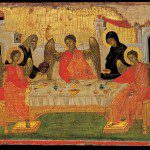Here, I think, Nietzsche is helpful. His legacy appeals to, say, the Alt-Right for two reasons: first, he preaches the virtue of irony, of the ability to find the points of inconsistency in any philosophical system so as to tear that system apart; second, he praises strength, in general what today might be called “traditional masculinity,” a point that Burton touches upon without invoking Nietzsche:
The narrative of the alt-right, however, displaces the battlefield into the realm of the incorporeal (and so, the safe). A battle over the Overton window is not a bloody one. This uncomfortable truth sits at the heart of the contemporary ultra-ironist’s disengagement and disembodiment: the suspicion that “real” masculinity, like the Wagnerian heroism of the past, demands that you actually die when your avatar does. Without that risk, the performance of masculine heroism may never cease to feel like a performance.
One might, in a highly-deformed version, reduce Nietzsche’s basic principle to: ironize their system and will your truth into being. A small section from The Antichrist clarifies:
Do I still have to add that in the entire New Testament there is only one solitary figure one is obliged to respect? Pilate, the Roman governor. To take a Jewish affair seriously — he cannot persuade himself to do that. One Jew more or less — what does it matter ?… The noble scorn of a Roman before whom an impudent misuse of the word ‘truth’ was carried on has enriched the New Testament with the only expression which possesses value—which is its criticism, its annihilation even: “What is truth?…”
It’s all here. Nietzsche cynically and unexpectedly reads the New Testament, extrapolating from his ironic criticism the value of Pilate’s famous question: “what is truth?” Up to this point, one can see how the Alt-Right sees itself as Nietzschean; their meme magic, their willingness to fly free above the realm of constructed meanings and to will into existence their own “truth” is easy enough to see. But they fail, at least in Nietzsche’s view, on one account: resentment.
For Nietzsche, resentment is the hallmark of the Nihilist, of the person who has seen the meaninglessness of it all and has responded not with heroism, but with anger, with dissatisfaction, with the quiet stirrings of a heart still whispering “why is life unjust?” Effectively, resentment is the scapegoating instinct, the redirection of one’s own inadequacy onto another. This is, to Nietzsche’s mind, why the Christian demonizes the strong man, why the Nazi hates the Jew, and why the Alt-Righter demonizes the Muslim. The true Nietzschean man must ironize, yes; he must be willing to make his vision true through the will to power, of course. But he must not succumb to resentment:
To be incapable of taking one’s enemies, one’s accidents, even one’s misdeeds seriously for very long—that is the sign of strong, full natures in whom there is an excess of the power to form, to mold, to recuperate and to forget […] Such a man shakes off with a single shrug many vermin that eat deep into others; here alone genuine ‘love of one’s enemies’ is possible—supposing it to be possible at all on earth. How much reverence has a noble man for his enemies!—and such reverence is a bridge to love.—For he desires his enemy for himself, as his mark of distinction; he can endure no other enemy than one in whom there is nothing to despise and very much to honor!
In this sense, we might say that the Alt-Right, stewed in this culture of irony, has become something of a deficient, resentment-filled Nietzscheanism; a mistake Nietzsche might write off with a derisive laugh.
But it is not just the Right that has adopted ironization; no, the Left has as well, albeit in a less overt way. At the anecdotal level, I know many on the Left who participate in the same meme culture available to the Right; one might even say that—Reddit, 4Chan, and the like aside—Tumblr is the meme-haven of the cultural Left. The Left’s Nietzscheanism is less mainstream than that of the Right, but, given our ironic cultural milieu, I think, no less important.
In 2016, the bottom of Liberalism (and I mean that as defined here) fell out. The Right responded with Trump on a wave of memes and resentment; they stepped in to fill the void and beat down any competing system of meaning. The Left was a bit more conflicted. Ultimately, Hillary (the option closer to traditional Left-Liberalism) won out. In the background of her campaign, however, silently, were the ideas of theorists like Michel Foucault, Judith Butler, and William Connolly. Let me be clear: none of these people is necessarily a Left-Liberal aligned with the policy positions of Hillary Clinton (in fact, the most sympathetic to her views is dead). But their self-professedly Nietzschean critiques of our culture certainly are; their ideas have come to influence the identitarian alliance constitutive of contemporary Left-Liberalism. The newborn self-fashioning of, say, identity politics, relies on the critiques of theorists like Foucault and Butler, who themselves rely on Nietzsche. They need irony just as much as the Right; both need it to tear down the structures with which they disagree while preserving and circumscribing a sphere for their own freedom. Both sides ascribe to deficient outgrowths of Nietzsche’s writings.
And yet the Left lost in 2016. Why? My hunch is that they lack the willingness to employ pre-existing structures of power to accomplish their ends. The Alt-Right is more than willing to do the Nietzschean thing. They recognize that, in a world in which nothing means anything, the only way to accomplish your “truth” is assertion, is to will that truth into being by any means necessary. The Left has not been willing to go this far. This may sound like a good thing—perhaps it is. But in a time mired in irony, when the rules of Nietzschean discourse reign, “good” may not cut it in the realm of power. In other words, if 2016 is the year of cynicism—of Nietzscheanism—the Right won because it’s better at playing the game.
What is to be done? Time will tell; we all must think more about what tools might not only save us from the Alt-Right, but from this vacuum of meaning.













